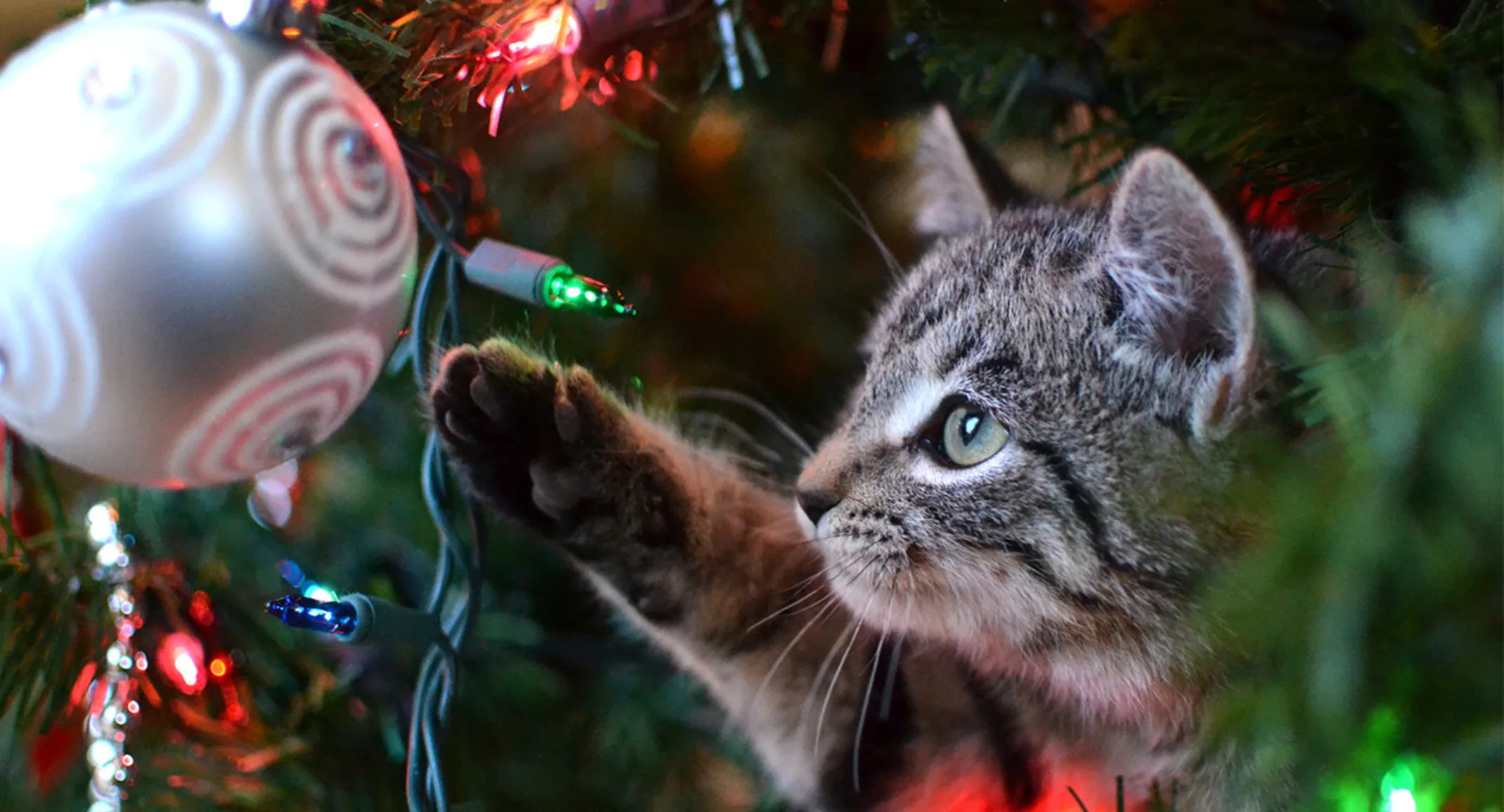10 Ways to Keep Your Pet Safe During the Holiday Season
Tips and Tricks

The holidays are almost here, and you should begin planning now, especially if you are a pet owner. Avoid a doggone disaster or a complete catastrophe, and learn how to keep your furry friends safe and happy during the hectic holiday season by following these simple tips.
#1: Do not share alcohol or recreational drugs with your pet
Alcohol is common at holiday parties, and if your pet imbibes from an unattended glass or from a bottle they inadvertently knocked over, they can become seriously ill. If you are serving wine, beer, or cocktails at your holiday gathering—or proofing dough that includes fermenting yeast—keep them safely out of your pet’s reach. Alcohol ingestion can cause your pet’s blood sugar, blood pressure, and body temperature to experience an extreme drop, which can lead to serious complications, and death. Pets’ alcohol toxicity signs are similar to those of people who overindulge, and may include:
Vomiting
Diarrhea
Incoordination
Depression
Seizures
Recreational drugs, such as marijuana, can also cause problems for your pet. Keep in mind that some guests may have various cannabis products, including edible products that look like candy or treats, in their coat pockets or purses. Marijuana toxicity causes central nervous system depression, incoordination, vomiting, and incontinence.
#2: Keep your pet away from chocolate
Chocolate—which pets cannot digest well—is one of the most common food toxicities emergency veterinarians see during the holiday season. Cats are less likely to consume chocolate than dogs—likely because they lack the sweet taste receptor—but chocolate is toxic for both species. All chocolate is toxic for pets, but dark chocolate and baking chocolate can be particularly harmful because they contain a higher toxin concentration than milk chocolate. If you suspect your pet has ingested chocolate or any toxic food, immediately call the 24-hour Pet Poison Helpline, or your veterinarian.
#3: Do not let your pet drink Christmas tree water
The water that keeps natural Christmas trees hydrated can be contaminated with fertilizers, additives, and dangerous bacteria. In addition, you should never add chemicals, such as bleach or tree fresheners, to your tree water. Prevent your pet from drinking this water by covering the tree stand and placing deterrents, such as citrus scents, nearby.
#4: Forgo feeding your pet fatty foods
You may enjoy spoiling your pet during the holidays, but do not show this devotion by sharing your rich holiday meal. Foods abundant in butter, oil, meat drippings, and grease can cause your pet severe pancreatitis, and are especially harmful to dogs, and certain breeds, such as miniature schnauzers, poodles, cocker spaniels, and Yorkshire terriers. If you cannot resist sharing a small taste of your meal with your pet, offer only a few morsels of lean white meat, sweet potato, or fresh vegetables.
#5: Keep holiday decor out of your pet’s reach
Holiday decorations, wrapping paper, packages, and small trinkets pique curious cats’ and dogs’ interest, and can cause serious problems if ingested. Small foreign bodies may pass through your pet’s gastrointestinal tract without problem, but larger items can become lodged and cause a life-threatening obstruction that requires emergency surgery. When decorating the house and wrapping presents, keep small items out of your pet’s reach, dispose of trash immediately, and securely close all trash bins.
#6: Choose pet-friendly holiday plants
Plants and floral arrangements are common holiday decorations and popular gifts, but many common holiday plants are toxic to pets. Choose pet-friendly flowers, and keep plants up high and out of your pet’s reach. If you have a cat, do not bring home lilies because they are extremely dangerous to them, and if your furry companion ingests any amount of leaves, flowers, or pollen, they can develop acute kidney failure. Plant varieties that are toxic to pets include:
Amaryllis
Balsam
Cedar
Christmas cactus
Holly
Mistletoe
Pine
#7: Store medications away from pets
According to the American Society for the Prevention of Cruelty to Animals (ASPCA) poison control center, human medications are the most common cause of pet toxicity. Safely store all prescription and over-the-counter medications out of your pet’s reach, and ensure holiday houseguests do the same. Contact your veterinarian immediately if your pet has or may have ingested any of the following human medications:
Nonsteroidal anti-inflammatories (NSAIDs)
Acetaminophen
Antidepressants
Attention deficit hyperactivity disorder (ADHD) or attention deficit disorder (ADD) medications
Heart medications
#8: Trim your tree with your pet’s safety in mind
When decorating your Christmas tree, consider your pet’s safety. Place breakable—or chewable—ornaments on the higher branches to prevent your dog’s wagging tail or your curious cat’s paw from knocking them off. Avoid placing homemade ornaments, especially those made of salt dough, where pets may be tempted to eat them. Do not put lights on the tree's lower branches where your pet can become entangled or get shocked by biting through the wire.
#9: Monitor your pet around candles
While candles can create a cozy ambiance, they can be dangerous around wagging tails and curious whiskers. Place burning candles on high shelves or mantels, and ensure you extinguish all burning candles before leaving the house. In addition, place a screen on your fireplace to prevent your pet from getting burned.
#10: Ensure your pet’s identification is current
Before the holidays become hectic, ensure your pet’s identification and contact information are accurate, and that their collar is securely fastened. A microchip provides your pet permanent identification, and significantly increases the likelihood that your lost pet will be returned home. If your pet has a microchip, ensure your contact information is up to date in the microchip company’s database. If your pet is not microchipped, schedule an appointment with your veterinarian to perform this quick procedure.
Follow our tips to keep your pet safe and happy this holiday season by planning ahead to avoid the hazards that celebrations and decorating can pose. Use this locator to identify the nearest veterinary hospital if your pet inadvertently experiences a holiday emergency.
